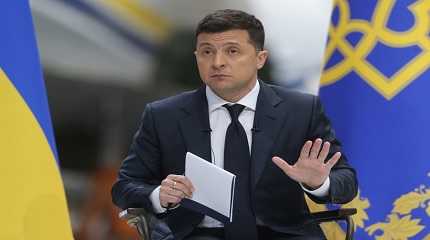
BEIJING, Feb. 15 (Xinhua) -- As tensions on the Ukrainian situation keep mounting, multiple countries have been engaged in shuttle diplomacy, trying to de-escalate the crisis.
German Chancellor Olaf Scholz arrived in Kiev on Monday for a working visit. After their talks, Ukrainian President Volodymyr Zelensky told reporters that the two parties discussed the peace process in and around Ukraine and the legal guarantees that would help to protect Ukraine.
In particular, Zelensky said that Ukraine needs energy security guarantees due to the risks associated with the Nord Stream 2 natural gas pipeline.
"We expect that in the near future we will be able to hold further talks and agree on a summit of the leaders of the Normandy Four," Zelensky said.
Ukraine and Germany are members of the Normandy format that also includes Russia and France.
Scholz said that Germany is trying to find a diplomatic solution to the situation around Ukraine.
"Together with France, we have intensified our efforts in the Normandy format. It's a difficult process, but I'm sure it's worth the effort," Scholz said.
Zelensky and Scholz also discussed Ukraine's aspirations to join the North Atlantic Treaty Organization (NATO) during their talks.
Scholz said that Ukraine's possible accession to NATO is currently "out of the agenda," the Interfax-Ukraine news agency reported.
After his stay in Kiev, the German chancellor is scheduled for a visit to Moscow on Tuesday.
Last week, French President Emmanuel Macron visited Moscow and held an hours-long discussion with Russian President Vladimir Putin over the Ukraine crisis.
After their talks, Macron said that his Russian counterpart assured "his desire to maintain the stability and territorial integrity of Ukraine."
Following his visit to Russia, the French president visited Ukraine. After his talks with Zelensky in Kiev, Macron told a joint press conference that France would continue working with Germany to mediate the crisis.
Wrapping up the visits, Macron met with Scholz in Berlin. At a joint press conference, the French president reaffirmed that pursuing dialogue with Russia is "the only path that will make peace possible in Ukraine."
Scholz emphasized "the maintenance of peace must intervene through diplomacy."
In recent days, the United States has hyped up tensions between Russia and Ukraine and stoked fears of a Russian "invasion."
Moscow denied the accusation, saying that Russia has the right to mobilize troops within its borders to defend its territory as NATO's activities constitute a threat to Russia's border security.
Also on Monday, UN Secretary-General Antonio Guterres held a virtual meeting with Russian Foreign Minister Sergei Lavrov. He also spoke separately with Ukrainian Foreign Minister Dmytro Kuleba.
In a press encounter, Guterres said he was deeply worried about the current tensions and increased speculation about a potential military conflict.
"The price in human suffering, destruction and damage to European and global security is too high to contemplate. We simply cannot accept even the possibility of such a disastrous confrontation," he said.
"There is no alternative to diplomacy. All issues, including the most intractable, can and must be addressed and resolved through diplomatic frameworks. It is my firm belief that this principle will prevail," said Guterres.
On Saturday, Putin discussed the Ukraine crisis with U.S. President Joe Biden and Macron respectively over the phone.
During these conversations, Putin reiterated the absence of a substantive response from the United States and NATO to Russian initiatives in addressing its security concerns, while agreeing to continue dialogue and contacts with the other two leaders.




